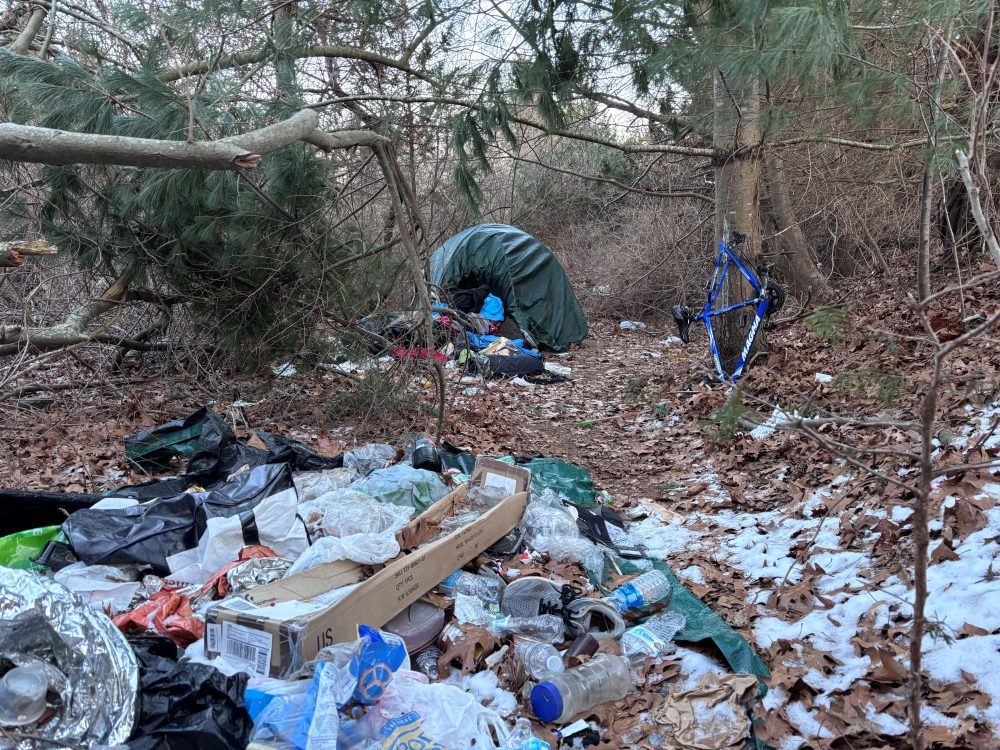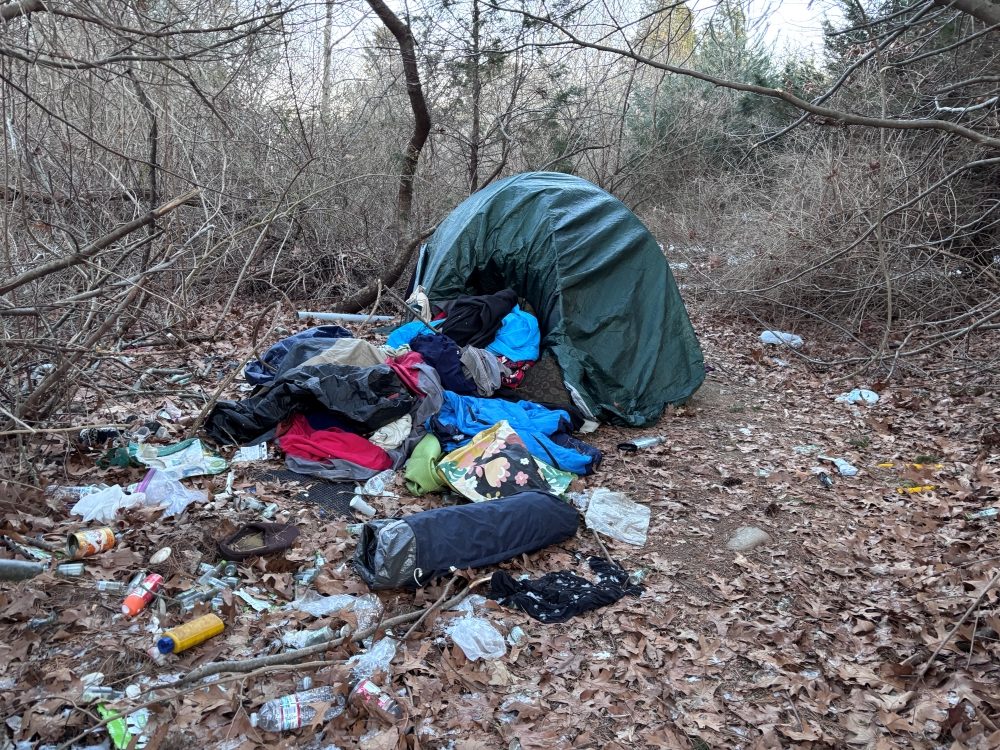The campsite in North Plymouth is a lonely outpost at the end of a trampled-down path. The ground is littered with evidence of lives upended. There’s a tattered tent, a rusting bicycle hanging from a tree, mismatched boots, takeout containers, a child’s coloring book.
No one would call this place home. Not by choice, anyway.
On a recent visit to the (apparently) abandoned encampment in woods, I wondered what became of the people who slept on this frozen ground. Will they return with warmer weather? Maybe their lives have taken a turn for the better.
No matter how you describe those without permanent shelter – homeless, unhoused, people experiencing homelessness – as Plymouth grows, so too do their numbers.
It’s not a surprise that the basic comforts of a modest apartment are out of reach for some people. The price of housing, food, insurance, real estate taxes, and utilities is increasingly a burden for even the fully employed. A pandemic-era moratorium that kept evictions at bay for years has been lifted, worsening the housing crisis. Those dealing with mental health conditions and substance use are weighed down by more challenges.
Putting an end to homelessness sounds aspirational to the max. But John Yazwinski has spent years addressing the problem through the lens of pragmatism. Yazwinski is CEO and president of Father Bill’s & Mainspring, the Brockton-based nonprofit that for decades has provided support to the region’s unhoused population through a range of services. Most important, it works to move people from sleeping outdoors, on a couch, or in a car into permanent housing. That where they can stand a chance of finding stability and receive help in finding a job and other basics of daily life.
For nearly 10 years it’s partnered with the Plymouth Task Force to End Homelessness on its Overnights of Hospitality program. From December through March, the program, overseen by Connie Melahoures, provides emergency shelter and warm meals on a rotating basis at three local churches – St. Mary’s on Court Street, the First Baptist Church on Westerly Road, and Christ Church Episcopal on Court Street.
“We have a public health crisis,” Yazwinski told me. “We have a lot of people struggling with mental health and substance use disorders. They’re not getting access to treatment, and they end up on our streets. We’re seeing more campsites throughout the Commonwealth.”
Pinpointing the number of people without a home in Plymouth is difficult, Yazwinski said. The seasonal church shelters take in between 15 and 20 people a night. An overall count last year pegged the unhoused population in town at 38. The real figure is likely much higher.
“The number has almost tripled in the last couple of years,” he said. “A lot of people started to struggle more with substance use during the pandemic.”
Though a night indoors is obviously important – especially with this winter’s below-normal temperatures – the wider focus is on finding what those in the field call “permanent supportive housing.”
Father Bill’s & Mainspring oversees about 67 Plymouth apartments and group-setting units for the formerly unhoused, Yazwinski said, and it’s looking for more. Overall, the organization manages more than 800 housing units in the region, with a budget of about $40 million.
“We’re seeing more people with physical disabilities,” he said. “Elder homelessness is one of our fastest growing populations. People with fixed incomes are getting priced out right now. We’ve lost a lot of nursing homes that were locally owned.”
Young adults aging out of foster care are also vulnerable to being without a home, he said.
“Or somebody is living in an apartment building, and it’s sold,” Melahoures said. “The landlord wants to renovate, so they move people out, and then they raise the rent. That’s part of the issue.”
Father Bill’s & Mainspring assists Plymouth’s emergency church shelters by providing staffers to spend the night and supplement a rotating roster of 35 to 40 volunteers organized by Melahoures. Volunteers come in before dinner and “stay for two to three hours to assist the paid staff,” she said.
The Plymouth shelter network also relies on volunteer meal providers. In all, she estimates that there are 150 volunteers on her list. The menu ranges from casseroles to stews to a variety of chicken or ham dishes.
“Most nights there is plenty of food,” Melahoures said. “They never go hungry.”
(If you want to volunteer at the church shelters, sign up to provide meals, or donate to Overnights of Hospitality, you can do so here.)

Melahoures recalled that when she started the program in 2004, “those of us involved hoped that within four or five years we would solve the problem of homelessness in Plymouth.”
Take a walk through downtown or nearby wooded areas and you’ll see that hasn’t happened. You might find a makeshift cardboard tent under a bridge embankment in Brewster Garden, a soggy sleeping bag off the path behind the Summer Street skate park, or a group of men passing time in an alleyway.
In my separate conversations with Yazwinski and Melahoures it quickly became apparent that the subject was too complex to wrangle into a single column. So I asked them to tell me what needs to happen in Plymouth to make more of a difference than the good work they and others are already doing.
They are both keen on establishing a year-round, 24/7 resource center here, similar to one Father Bill’s & Mainspring operates in Quincy and is opening in Brockton.
“What we’re promoting is a resource center that gives people a place to stay during the day,” Yazwinski said, “even if they don’t use the shelter at night.”
“People can come there and get lunch,” he explained. “They can wash their clothes. They can meet with a counselor. Potentially, we can build a trust with the people that live outside and get them maybe to go to treatment.”
Ideally, Melahoures said, a resource center in Plymouth would include shelter space as well.
“There still a need for emergency shelter in Plymouth,” she said. “But we do recognize that sheltering is not the answer to solving homelessness.”
More housing, however, is a big part of the equation. Contrary to a common complaint heard in Plymouth – “stop building!” – we need a lot more. But it has to be the right kind.
“When we do build it, we’re not building enough of it for our poorest neighbors,” Yazwinski said. “A lot of that right now is our elderly and disabled people, our veterans that are disabled.”
He recalled years ago asking overnight guests at Father Bill’s Place in Quincy about their needs.
“Eighty percent of the answers were the same,” he said. “It wasn’t a bed, it wasn’t a meal, it wasn’t clothes, though they needed all those things that night. They wanted a home. There’s a lot of people that even when we have an emergency shelter, they won’t come in. But
when you have your own key and you can close your own door, the majority of people are willing to come inside.”
Mark Pothier can be reached at mark@plymouthindependent.org.

